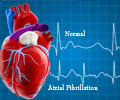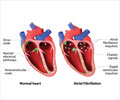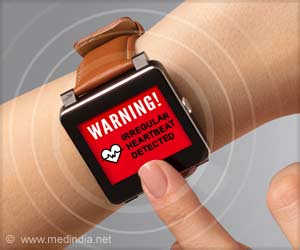Risk of atrial fibrillation in adulthood could be higher for large newborns weighing over 4,000 grams than those with normal birth weight, finds a new study.

‘Preventing elevated birth weight may be a novel way to avoid atrial fibrillation in offspring.’
Read More..




He added: "People with a high birth weight must choose a healthy lifestyle to reduce their chances of developing the heart rhythm disorder."Read More..
Atrial fibrillation (AFib) is the most prevalent heart rhythm disorder, affecting over 40 million individuals worldwide. People with AFib have a 5 times higher risk of having a stroke.
The association between birth weight and AFib is controversial. This study examined the lifetime causal effect of birth weight on the atrial fibrillation risk.
The researchers led a naturally randomized controlled trial - a technique known as Mendelian randomization. First, they used data from 321,223 people in a genome-wide association study (GWAS) to identify 132 genetic variants linked to birth weight. Next, they classified which of those variants play a role in AFib using data from 537,409 members of the Atrial Fibrillation Consortium.
To conduct the naturally randomized controlled trial, the 132 genetic variants were randomly allotted to the 537,409 volunteers at conception, giving each person a birth weight in grams. The investigators then examined the relationship between birth weight and atrial fibrillation.
Advertisement
Dr. Chen said: "A major strength of our study is the methodology, which allows us to conclude that there may be a causal link between high birth weight and atrial fibrillation. However, we cannot disregard the possibility that adult height and weight may be the reasons for the connection."
Advertisement















